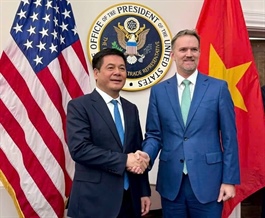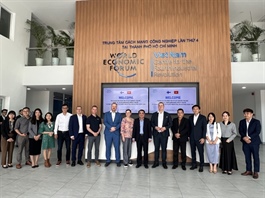Clear exit strategies key to unlocking private capital
Clear exit strategies key to unlocking private capital
Experts emphasised that Việt Nam’s startup scene is thriving, but private capital will only flow if investors see viable returns.

The pork processing line of the Masan MEATDeli. Masan Group has offered multiple exit routes including IPOs and trade sales for its investors. — VNA/VNS Vũ Sinh |
As Việt Nam positions itself as a leading destination for private capital in Southeast Asia, investors and founders now all care about one thing: a clear and reliable exit strategy.
Industry experts said that while Việt Nam’s start-up scene is buzzing and its economy remains one of the most dynamic in the region, private capital will only continue to flow if investors are assured of viable returns.
In other words, it’s not enough to enter the market with enthusiasm – there must be a way out.
According to Michael H. Nguyễn, deputy CEO of Masan Group, investors don’t just look at the entry point, they care even more about how and when they can exit.
Over the past 17 years Masan has raised over US$2 billion from a blend of strategic and financial investors, Nguyễn said during a recent panel on pathways to exits in Việt Nam.
He attributed this achievement to Masan’s unwavering commitment to building trust with investors, offering multiple exit routes including IPOs and trade sales.
“What makes us proud is that most of those investors have come back to invest again," he said.
"That shows they believe they can generate returns – which requires a clear path to exit. It’s a credible path that any investor should seriously consider when looking at Việt Nam.”
Nguyễn said Masan offered three main exit options for investors: secondary sales, strategic sales (like Singha’s stake in KKR), and IPOs, such as Masan Group’s listing. "While IPOs remain a viable option,the market is more challenging now."
This view is shared by Lê Hoài Vy, general partner at Do Venture and chairperson of the Vietnam Private Capital Agency (VPCA), a strong voice for enhancing Việt Nam’s investment landscape.
She believes Việt Nam is at a pivotal moment. For the first time, the government is demonstrating a strong and clear will to support innovation and startup growth.
However, she warned that a lack of high-profile exit success stories in recent years held the ecosystem back.
“There’s a great deal of investor interest, but without successful exits, especially in the last three to four years, reinvestment becomes harder,” Vy said.
“We need to create more exit stories like we once had with Thế Giới Di Động (Mobile World). That builds momentum, credibility and trust in the market.”

The pork processing line of the Masan MEATDeli. Masan Group has offered multiple exit routes including IPOs and trade sales for its investors. — VNA/VNS Vũ Sinh |
The Vietnam Innovation and Capital Report 2025, released last month by the Việt Nam Private Capital Agency (VPCA), National Innovation Centre (NIC), and Boston Consulting Group (BCG), said in 2024 the country drew nearly $2.3 billion across 141 foreign-funded innovation deals.
Although total investment fell by 17 per cent compared to the previous year, this was modest relative to the 35 per cent global decline, reflecting Việt Nam’s resilience and growing appeal.
The report pointed out key growth drivers such as strong GDP growth at 7.1 per cent in 2024 (higher than most Asian economies), rising foreign investment, an expanding middle class expected to reach 46 per cent of the population by 2030, and a digital economy aiming to grow from 18.3 per cent to 35 per cent of GDP by 2030.
According to Chris Milliken, a partner in Baker McKenzie Vietnam, Việt Nam is at a promising turning point. It can learn from developed capital markets like the US, the UK, Hong Kong (China), Japan, and South Korea.
Although these markets have different systems, they share common goals of protecting investors and ensuring liquidity.
Milliken said Việt Nam should adopt global best practices in building its capital market rules. For instance, introducing a takeover code or easing regulations on share offerings and private placements could bring more clarity.
“What investors value most is consistency and clear rules. If Việt Nam aligns with international standards, it will lower the entry barrier for investors and quickly close the gap between them and local companies,” he added.

The pork processing line of the Masan MEATDeli. Masan Group has offered multiple exit routes including IPOs and trade sales for its investors. — VNA/VNS Vũ Sinh |
Indeed, the problem is structural. Though notable players like MoMo and Base.vn are gaining traction, the Vietnamese capital markets still present barriers. Strict listing regulations, especially for technology companies that may not yet be profitable, are a key obstacle.
Chairperson Vy pointed out that while manufacturing firms have physical assets and predictable profits, tech startups would operate on a different timeline.
“Look at Amazon – it took over a decade to become profitable,” she said.
“We need pilot schemes that allow pioneering tech companies to access the IPO market, even if they are not yet profitable but show strong growth and robust balance sheets.”
The consequences of inaction are visible.
As Vy noted, many foreign funds still lack a deep understanding of Việt Nam and remain cautious. If they cannot envision a clear exit within 5–10 years, they may simply redirect their capital elsewhere.
According to Nguyễn of Masan Group, there are reasons for optimism nonetheless. Việt Nam boasts a young, educated, and increasingly experienced workforce. He reflected on the transformation within Masan, where the once predominantly foreign-led leadership has been replaced by local talent.
“When I joined, 80 per cent of our group-level staff came from overseas. Now, it’s mostly young, talented Vietnamese professionals,” he said. “That’s a huge shift – and it gives me hope.”
Experts also believe Việt Nam can become a regional hub for private equity and venture capital by strengthening legal infrastructure and fostering a culture of transparency. Doing so would not only benefit current companies but create an upward spiral – where early-stage investors exit successfully and reinvest their capital into the next generation of start-ups.
“Investment isn’t just about money,” Vy said.
“It’s about mentorship, partnership, and long-term commitment. But at the end of the day, every fund needs to exit. If we can build a clear path for that, Việt Nam will become one of the most attractive markets in the region.”
- 08:05 24/05/2025
























